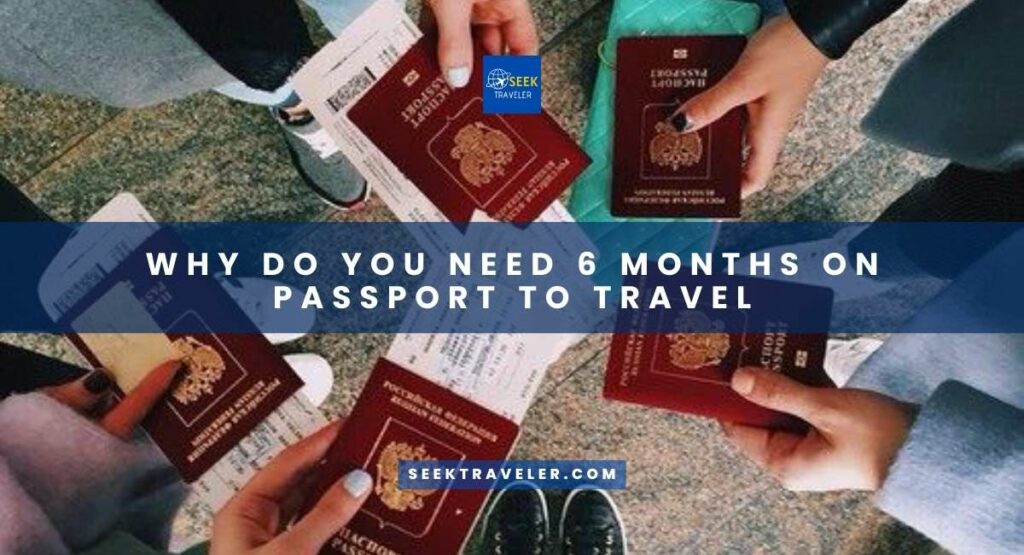As someone who loves to travel, I know the importance of having a valid passport when exploring new destinations. However, did you know that there is a rule that requires your passport to be valid for at least six months before you can enter certain countries?
This is known as the Six-Month Rule, and it’s crucial to understand its implications before embarking on your next adventure. In this article, we’ll delve into why this rule exists and what it means for travelers.
We’ll also explore the consequences of not meeting this requirement and provide tips on how to ensure your passport is up-to-date. So if you’re planning an international trip in the near future, keep reading to find out everything you need to know about the Six-Month Rule.
Explanation of the Six-Month Rule
You’ll want to make sure your passport is valid for at least six months beyond your planned departure date because some countries have this requirement in place. This rule, known as the Six-Month Rule, is a requirement that many nations enforce to ensure that visitors have ample time on their passports. It’s important to note that this rule applies not only to tourists but also to business travelers and anyone else traveling internationally.
The Six-Month Rule can be confusing for many travelers, especially those who are planning trips well in advance. It’s important to check with the embassy or consulate of the country you plan on visiting to find out if they require this rule.
Some countries, such as Canada and Mexico, do not require it at all, while others may allow you entry with less than six months left on your passport but will only give you permission to stay until the expiration date of your passport.
Having a valid passport is crucial when traveling internationally, and ensuring that it meets the requirements of each country you plan on visiting is essential. In addition to the Six-Month Rule, other requirements may include having a certain number of blank pages in your passport or obtaining a visa before arrival.
By doing your research ahead of time and making sure all necessary documents are in order, you can avoid any potential issues and enjoy a stress-free trip abroad.
Importance of a Valid Passport
Having a valid passport is crucial for hassle-free international travel. Your passport should be valid for at least six months beyond your intended stay in a foreign country. Without it, you may not be able to board your flight or enter the country you’re visiting.
A valid passport serves as your primary form of identification when traveling abroad. It contains personal information like your name, date of birth, nationality, and photo. Authorities use this information to verify your identity at border crossings or when applying for visas. You may need to present additional forms of identification, but having a passport is always essential.
To ensure you have a valid passport before traveling, check its expiration date well in advance. You can do this by checking the expiration date on the front page or contacting the issuing authority directly. Once you confirm your passport is valid for at least six months beyond your trip, check entry requirements for the countries you plan on visiting.
Checking Entry Requirements
Before traveling internationally, it’s crucial to check the entry requirements for each country you plan on visiting in order to ensure a smooth and hassle-free trip. One of the most important things to check is your passport’s expiration date.
Many countries require that your passport be valid for at least six months beyond your expected departure date. This means that if your passport will expire within six months of your planned travel dates, you may not be allowed to enter the country.
To avoid any issues with entry requirements, it’s important to make sure your passport is up-to-date before booking any international trips. Even if you have several months left before your passport expires, it’s a good idea to renew it early just in case.
Additionally, some countries may have other specific entry requirements such as visas or proof of vaccinations, so it’s essential to research these ahead of time as well.
Not meeting the six-month rule can result in serious consequences such as being denied entry into a country or even being stranded abroad until you can obtain a new passport. It can also lead to missed flights and other travel disruptions which can be stressful and costly.
By taking the time to research entry requirements and ensuring that your passport is up-to-date, you can save yourself from potential headaches down the road and enjoy a worry-free international trip.
Consequences of Not Meeting the Six-Month Rule
So, what happens if you don’t meet the six-month rule for passport validity? Well, as I found out from personal experience, it can lead to some serious consequences.
Firstly, you may be denied entry into a country altogether – a frustrating and expensive situation to be in.
Secondly, your travel itinerary could get significantly disrupted or even cancelled altogether – causing further financial losses and stress.
Lastly, there are potential legal and financial consequences that come with failing to comply with entry requirements. Needless to say, it’s important to keep this rule in mind when planning any international travels.
Denied Entry into a Country
Congratulations, it seems that your passport’s expiration date was closer than you thought and now you get to experience the thrill of being denied entry into a country. This can be an incredibly frustrating experience, especially if it happens at the beginning of a long-awaited trip.
However, it’s important to understand why this six-month rule exists in the first place. When you enter a foreign country, immigration officials want to ensure that you have enough time left on your passport to cover your entire stay. If your passport is set to expire within six months of your arrival date, they may deny you entry because they don’t believe you’ll have enough time to complete your trip before your document expires.
This can often result in lost travel expenses and significant stress as you try to figure out what went wrong with your plans. As a traveler myself, I know how important it is to plan every detail of a trip carefully. The last thing anyone wants is for something like an expired passport or visa issue to derail their plans.
That’s why understanding these rules and regulations is so crucial for anyone looking to travel internationally. With that said, let’s take a look at some other issues that can arise with travel itineraries.
Issues with Travel Itinerary
Navigating the complexities of international travel can be challenging, and one issue that may arise is complications with your itinerary. I’ve experienced this firsthand when I realized my passport was expiring in less than 6 months while planning a trip to Europe.
Despite having already booked flights and accommodations, I quickly learned that many countries require a minimum of 6 months validity on a passport in order to enter.
This issue with my itinerary caused me to scramble for a solution, as I didn’t want to risk being denied entry at the airport. Thankfully, I was able to expedite the renewal process for my passport and ultimately avoided any issues during my travels.
However, it serves as an important reminder for anyone planning international travel to double-check all necessary documents and requirements well in advance of their trip. Failure to do so could result in legal and financial consequences down the line.
Legal and Financial Consequences
You don’t want to end up in a sticky situation and face serious legal or financial consequences, so make sure you’re aware of all the rules and regulations before embarking on your international adventure.
Many countries require that your passport be valid for at least six months beyond your planned departure date. This means if your passport is set to expire within six months of your return date, you may not be able to enter the country you’re visiting.
Not only will this cause major disruptions to your travel plans, but it could also result in hefty fines or even deportation. So, before booking any flights or accommodations, check the entry requirements for the countries you plan on visiting and ensure that your passport has enough validity left before making any commitments.
Trust me when I say that taking a little extra time now could save you from a lot of hassle down the road!
Now that we’ve covered why having six months validity on your passport is important, let’s dive into some tips for meeting this requirement without stress or worry.
Tips for Meeting the Six-Month Rule
If you’re planning a trip abroad, make sure to check the expiration date on your passport well in advance to avoid any potential headaches. The six-month rule can be confusing and stressful, but there are some tips that can help ensure you meet the requirement.
First, keep in mind that the six-month rule applies to your passport’s expiration date, not the length of time you plan to stay in a foreign country. This means that even if you’re only staying for a week, your passport still needs to be valid for at least six months after your planned departure date.
Another tip is to renew your passport early. Don’t wait until the last minute as processing times can vary and unexpected delays can occur. It’s recommended to renew your passport at least nine months before it expires so that you have plenty of time to receive it and address any issues that may arise during the process.
Lastly, consider applying for expedited processing or paying extra fees for faster service if necessary. If you’re traveling soon and don’t have enough time to renew your passport before your trip, this may be an option for meeting the six-month rule. Just keep in mind that these services do come with additional costs.
Remembering these tips can help ensure that you meet the six-month rule and avoid any legal or financial consequences when traveling abroad.
For those who are still confused about how this rule works or what it means for their travel plans, there are some frequently asked questions that may provide more clarity. For example, some common questions include whether this rule applies to all countries or just certain ones and what happens if a traveler’s passport expires while they are already overseas.
By understanding these details and taking proactive steps towards meeting the requirement ahead of time, travelers can enjoy a stress-free trip without worrying about their passports causing problems along the way.
Frequently Asked Questions
Now that you know some tips on how to meet the six-month rule, let’s answer some frequently asked questions about it.
One of the most common ones is why do you need 6 months on your passport to travel? Well, this requirement is imposed by many countries as a way to ensure that travelers have enough time left on their passports before they expire and return back home. It also allows for unexpected situations like delayed flights or an extended stay in a foreign country.
Another question that arises is whether this rule applies only to US citizens. The answer is no, it applies to all nationalities and can vary depending on the country of destination. Some countries require three months validity while others require one year so it’s important to check with the embassy or consulate of your destination country before you travel.
Finally, what happens if you don’t meet the six-month rule? Unfortunately, airlines won’t allow you to board your flight and immigration authorities may deny entry into the country which can result in costly changes to your travel plans. So make sure to always check your passport expiration date and renew it at least 6 months prior to its expiration date if planning international travel.
As we wrap up our discussion on the six-month rule, remember that having a valid passport with sufficient time left before its expiration date is crucial when traveling abroad. Don’t let an expired passport ruin your vacation plans! Renew early and double check with embassy or consulate requirements for any special rules or visa requirements for your specific destination country.
Conclusion
Ensure that your international travel plans go smoothly by checking the validity requirements of your passport for your destination country. Many countries require travelers to have at least six months remaining on their passport before allowing them to enter. This is because it ensures that visitors will not overstay their welcome and also allows time for unexpected delays or emergencies.
It’s important to note that even if a traveler has a valid visa, they may still be denied entry if their passport does not meet the validity requirements of the destination country. This means that even if you have all the necessary documents, failing to check your passport’s expiration date could result in being turned away at the border.
To avoid any travel mishaps, make sure to check your passport well in advance of your trip and renew it if necessary. Don’t wait until the last minute as processing times can vary and you don’t want to risk missing out on a trip due to an expired passport.
By taking this small step, you’ll ensure a hassle-free journey and be able to fully enjoy all that your destination has to offer!
Conclusion
In conclusion, understanding the Six-Month Rule is crucial when it comes to international travel. It’s essential to have a valid passport with at least six months’ validity remaining before your planned departure date.
This rule exists because countries want to ensure that travelers have enough time on their passports to cover any unexpected delays or emergencies during their trip. Some may argue that renewing a passport can be tedious and expensive, but it’s important not to overlook the consequences of not meeting this requirement.
Being denied entry into a country due to an expired or soon-to-expire passport can result in missed flights, lost reservations, and wasted money. Moreover, it can even lead to legal trouble if you’re found traveling without proper documentation. To avoid these issues and enjoy smooth travels, make sure you check entry requirements well in advance and renew your passport as needed.
By staying informed and proactive about your travel documents, you’ll save yourself from any unwanted surprises during your journey abroad.

Meet Debra. If you can’t imagine traveling without your furry friend, then Debra Eriksen is your go-to expert. Debra has embarked on pet-friendly journeys across more than 20 countries, making her an expert in combining wanderlust with pet ownership. Her articles provide practical tips, invaluable advice, and heartwarming stories of exploring the world with her beloved dog. Let Debra be your guide to creating unforgettable memories with your four-legged companion while exploring new horizons.



